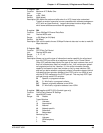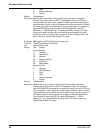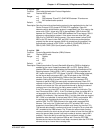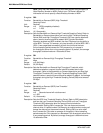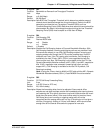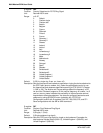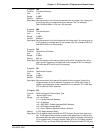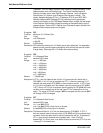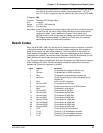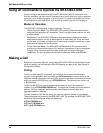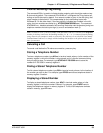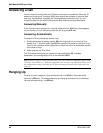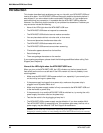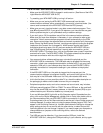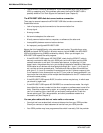
57
Chapter 4 - AT Commands, S-Registers and Result Codes
MTA128ST-USB
Auto-synchronizing allows the TA to adapt to the client’s network rate without
any need for the host to have its network rate predetermined. If S77=2
and a V.110 call is originated, then the network rate will be that of S76 ($MB).
S-Register: S80
Function: Persistent DTR Dialing Delay
Unit: 1 second
Range: n=1-255 (1-255 seconds)
Default: 5 (5 seconds)
Description:Once DTR is detected as present (active high) and other conditions required
for the TA to dial are met, a delay of S80 seconds will occur before stored
number 0 is dialed. Some conditions include the TA not being in the
@CONFIG menu, not having a data call present at the time, and Persistent
DTR Dialing must be enabled. By default the TA will delay for 5 seconds
before dialing when all conditions are satisfied.
Result Codes
When the MTA128ST-USB (TA) receives an AT command from the computer or terminal,
it attempts to execute the command, then sends a status message to the computer or
terminal that reports the result of the command. The TA provides you with several of
these response messages, or result codes, which can be displayed on your monitor or
intercepted and used by your communications software. Using the V command, you can
select whether the result codes are terse (numbers) or verbose (words).
The TA’s result codes are listed below. Note that the speed of an ISDN channel is always
either 56 Kbps or 64 Kbps. Connect messages indicate the speed of the connection
between the TA and your computer or terminal.
TERSE VERBOSE DEFINITION
0 OK TA executed the command without error
1 Connect TA established an ISDN connection
2 Ring TA detected a ring caused by incoming call
3 No carrier TA did not detect carrier within time allotted by S-
Register S7
4 Error Error in the AT command
5 Connect 1200 TA connected at 1200 bps
6 No dial tone TA has a poor connection to ISDN network
7 Busy TA detected a busy signal
9 Connect 600 TA connected at 600 bps
10 Connect 2400 TA connected at 2400 bps
11 Connect 4800 TA connected at 4800 bps
12 Connect 9600 TA connected at 9600 bps
14 Connect 19200 TA connected at 19200 bps
28 Connect 38400 TA connected at 38400 bps
56 Connect 56000 TA connected at 56000 bps
64 Connect 64000 TA connected at 64000 bps
P /PPP TA using Point-to-Point protocol
T /V.110 TA using V.110 rate adaption protocol
V /V.120 TA using V.120 rate adaption protocol
X /X.75 TA using X.75 rate adaption protocol



